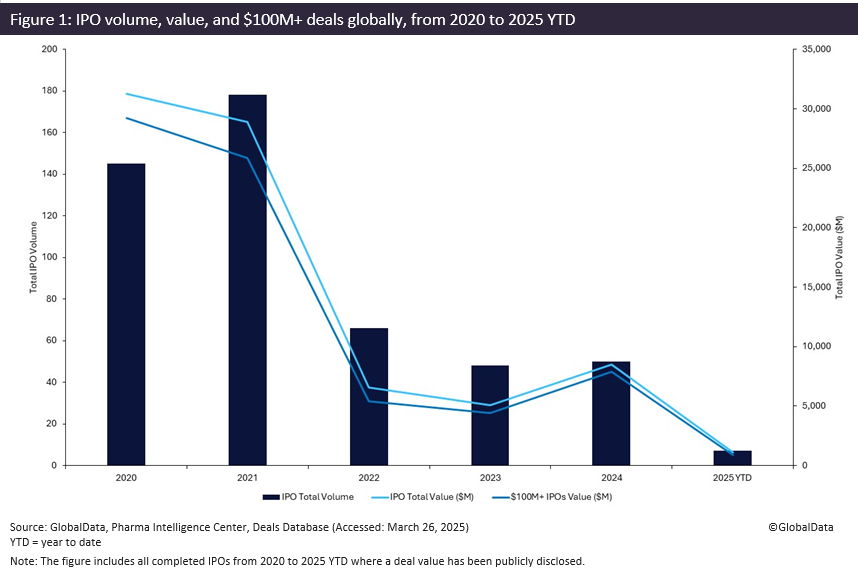Biopharmaceutical initial public offerings (IPOs) saw an upturn in 2024, with 50 completed IPOs raising a total of $8.52 billion – a 1.6-fold increase from the $5.06 billion raised in 2023. As such, 2024 had the highest total IPO value raised since 2021, signaling a recovery in public markets. This recovery is attributed to interest rate cuts by the US Federal Reserve following the two-year downturn in 2022 and 2023 driven by high interest rates, according to GlobalData’s Pharma Intelligence Center Deals Database. An IPO occurs when a private company offers its shares to the public and, upon completion, becomes a publicly traded company listed on a stock exchange.

Although the volume of completed IPOs stagnated, with only 50 deals in 2024 compared to 48 deals in 2023 (Figure 1), completed IPOs that raised more than $100 million witnessed an almost twofold increase, from raising $4.39 billion across 15 IPOs in 2023 to raising $7.88 billion across 24 IPOs in 2024. This trend suggests that while public investors remain selective, increased capital availability due to interest rate cuts has facilitated investments in private biopharmaceutical companies with a strong value proposition. In March 2024, Switzerland-based dermatology company Galderma raised $2.48 billion in the largest biopharmaceutical IPO completed that year. This followed a series of setbacks amid market volatility, including a planned IPO in February 2022 that did not close, and Galderma’s postponement of its IPO in March 2023.
The total IPO deal value for discovery and preclinical-stage companies dropped fourfold from $490.6 million in 2023 to $112.5 million in 2024. Meanwhile, later-stage companies — those with Phase II, Phase III, pre-registration or marketed-stage drugs at the time of the IPO — saw their total IPO deal value double from $2.18 billion in 2023 to $5.69 billion in 2024, indicating a shift in public investor preference towards more advanced-stage companies.
Trump’s administration has brought uncertainty to the industry
The increase in high-value IPOs completed in 2024 signals renewed optimism for biopharmaceutical companies looking to go public, especially those with strong clinical data and financial performance. However, IPO activity could be dampened by an anticipated increase in biopharmaceutical M&A in 2025 as companies seek to refill their pipelines ahead of upcoming patent expirations. Public market volatility in recent years has led to the maturation of private companies that chose to delay going public, making them more attractive acquisition targets.
US President Donald Trump’s administration has introduced uncertainty to the biopharmaceutical industry across healthcare policies, drug pricing reforms and regulatory frameworks, all of which could impact investor confidence. Trump’s recent tariff announcement on imports from Canada, Mexico and China has led to increased market volatility, potentially delaying IPOs as investors await the countries’ responses to the tariffs.

US Tariffs are shifting - will you react or anticipate?
Don’t let policy changes catch you off guard. Stay proactive with real-time data and expert analysis.
By GlobalData




